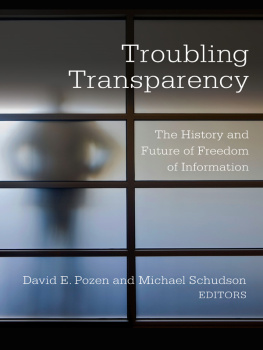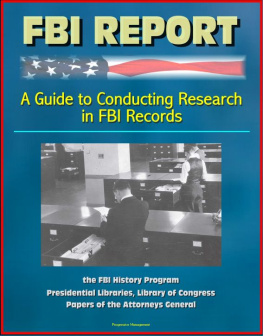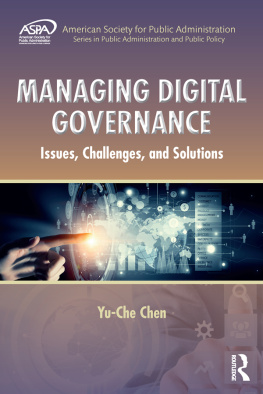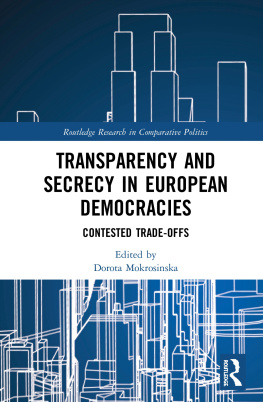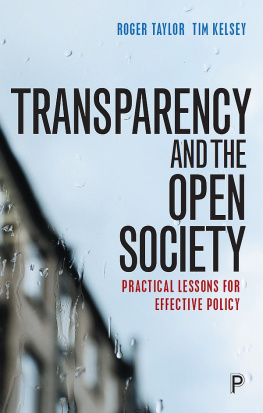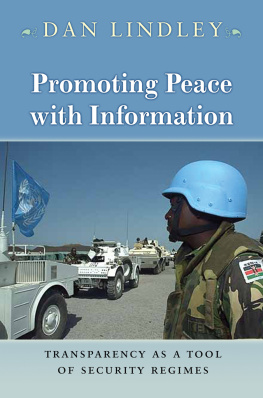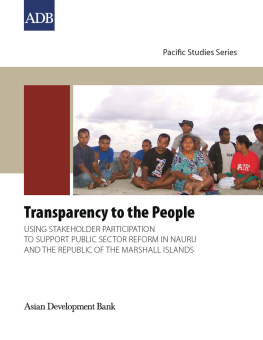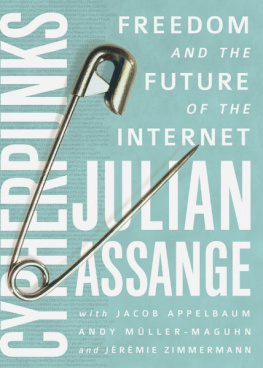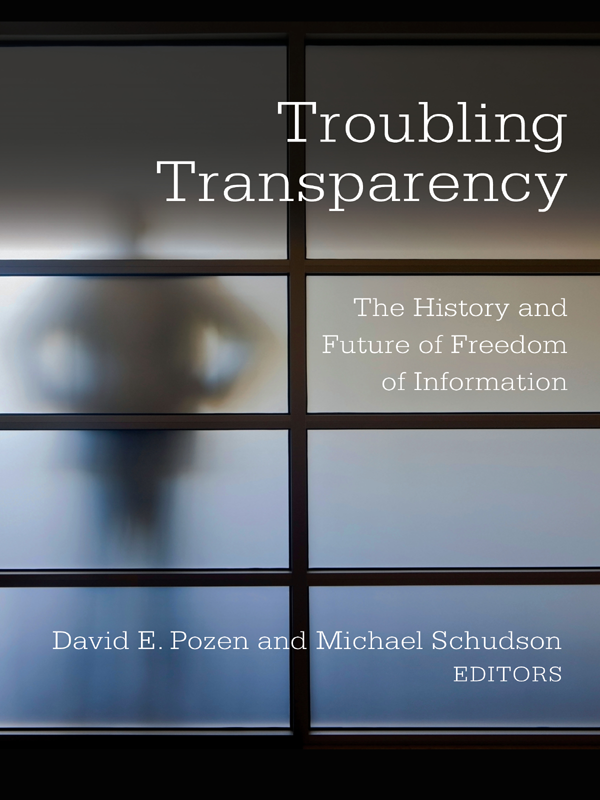Table of Contents
TROUBLING TRANSPARENCY
TROUBLING TRANSPARENCY
THE HISTORY AND FUTURE OF FREEDOM OF INFORMATION
Edited by David E. Pozen and Michael Schudson
COLUMBIA UNIVERSITY PRESS NEW YORK
COLUMBIA UNIVERSITY PRESS
Publishers Since 1893
New York Chichester, West Sussex
cup.columbia.edu
Copyright 2018 Columbia University Press
All rights reserved
E-ISBN 978-0-231-54580-8
Library of Congress Cataloging-in-Publication Data
Names: Pozen, David E., editor. | Schudson, Michael, editor.
Title: Troubling transparency : the history and future of freedom of information / Edited by David Pozen and Michael Schudson.
Description: New York : Columbia University Press, 2018. | Includes index.
Identifiers: LCCN 2017061191 (print) | LCCN 2018000742 (ebook) | ISBN 9780231545808 (electronic) | ISBN 9780231184984 (cloth : alk. paper) | ISBN 9780231184991 (pbk.)
Subjects: LCSH: United States. Freedom of Information Act. | Government informationUnited States. | Public recordsLaw and legislationUnited States.
Classification: LCC KF5753 (ebook) | LCC KF5753 .T76 2018 (print) | DDC 342.73/0662dc23
LC record available at https://lccn.loc.gov/2017061191
A Columbia University Press E-book.
CUP would be pleased to hear about your reading experience with this e-book at .
Printed in the United States of America
Cover design: Milenda Nan Ok Lee
Cover art: Blend Images / Alamy
CONTENTS
David E. Pozen and Michael Schudson
Sam Lebovic
Frederick Schauer
Mark Fenster
Margaret B. Kwoka
Katherine Fink
James T. Hamilton
Seth F. Kreimer
Nadia Hilliard
Cass R. Sunstein
Beth Simone Noveck
Katie Townsend and Adam A. Marshall
Kyu Ho Youm and Toby Mendel
Gregory Michener
Irma Erndira Sandoval-Ballesteros
THIS BOOK represents the work of many hands. Most obviously, we are indebted to the contributors who have provided fine papers and have weathered in good spirit our editorial interventions along the way.
Less apparent, we owe much to those who offered moral and financial support for the conference we organized in honor of the fiftieth anniversary of the U.S. Freedom of Information Act. Held at the Columbia Journalism School in June 2016, the two-day event was made possible by a generous gift from Columbia University President Lee Bollinger, who also supplied welcoming remarks. Both of us significantly underestimated how much a conference like this would cost; President Bollinger, fortunately, did not. Bruce Shapiro, executive director of the Dart Center for Journalism and Trauma at the Columbia Journalism School, provided us our first financial assistance and thereby helped us believe that we would indeed be able to pull together an ambitious gathering of journalists, FOIA officers, freedom of information activists, historians, media scholars, and legal scholars. We are grateful also to Dean Steve Coll of Columbia Journalism School, to the Journalism Schools Dean of Academic Affairs Sheila Coronel, and to Dean Gillian Lester of Columbia Law School, all of whom endorsed our efforts.
Many other participants in the conference contributed to our own education about freedom of information laws in the United States and elsewhere. Their absence from these pages reflects only that this book is not a conference proceedings but rather a collection of the academic (yet nonetheless readable!) papers that were presented in early form at Columbiaalong with four other papers that were not part of the event but that, in earlier incarnations, seemed so essential to our thinking about FOIA that we twisted arms to have the authors revise earlier work for presentation here.
There are a great many logistical issues that arise in the planning of an international interdisciplinary conference, and we could not have managed without the stellar assistance of Soomin Seo, then an advanced Ph.D. student in communications at Columbia, now an assistant professor in the Klein College of Media and Communication at Temple University. Kelly Boyce, assistant director of the Dart Center, also provided indispensable support. More recently, Kara Kohn-Gardner assisted with proofreading of the manuscript.
We are very grateful to our editor, Philip Leventhal, for shepherding this project to completion. He has worked wonders to make Columbia University Press a leader in journalism studies and adjacent fields. The whole staff at Columbia University Press has been a pleasure to work with.
We recognize that edited volumes do not make most publishers swoon. Nonetheless, sometimes edited volumes can become important signposts in intellectual life, and we hope that this may be one such case. Taking transparency in governmental affairs seriously, without taking it as a Holy Grail of democracy, is an ongoing scholarly and political task that we hope this book helps advance.
We dedicate this book to our families, whom we love more than we can say.
David E. Pozen and Michael Schudson
TRANSPARENCY IS a value in the ascendance. Across the globe, the past several decades have witnessed a spectacular explosion of legislative reforms and judicial decisions calling for greater disclosure about the workings of public institutions. Freedom of information laws have proliferated, claims of a constitutional or supra-constitutional right to know have become commonplace, and an international transparency lobby has emerged as a civil society powerhouse. Open government is seen today in many quarters as a foundation of, if not synonymous with, good government.
At the same time, a growing number of scholars, advocates, and regulators have begun to raise hard questions about the costs and limits of the transparency movement. Some of these commentators accept the movements standard premises and prescriptions but worry that open government measures are not actually delivering the openness they promise due to inadequate legislative funding, bureaucratic resistance, or cramped judicial interpretations. Others wonder whether traditional open records and open meetings laws are well suited to twenty-first-century transparency challenges, or whether these laws need to be reimagined for the digital age. A third group of commentators has thrown a harsh light on transparencys political and administrative effects, emphasizing its potential to facilitate neoliberal agendas or to undermine deliberation, deal-making, and institutional capacity.
These different strains of skepticism are coalescing and have largely been confined to discrete discourses so far. They have not arrested transparencys ascent in the NGO community or in popular culture. But they have developed to the point where we might say that government transparency, as a democratic ideal, is contested not only in practice but also in theory.
This volume seeks to highlight the richness of these debates and to grapple with some of the complexity and ambivalence that increasingly characterize the best academic writing on transparency. It focuses on the United States Freedom of Information Act (FOIA)both to contain what might otherwise be an unwieldy inquiry and because FOIA is an especially canonical transparency instrument, one of the ur-texts of the field. The essays collected here ask, in various ways, why FOIA and associated arrangements have come to be seen as troubling; whether that perception is warranted; and, if so, what can be done about it. In asking these questions, the essays themselves trouble the notion that we are reaching durable consensus, or indeed any widespread agreement, with regard to many aspects of open government design.

